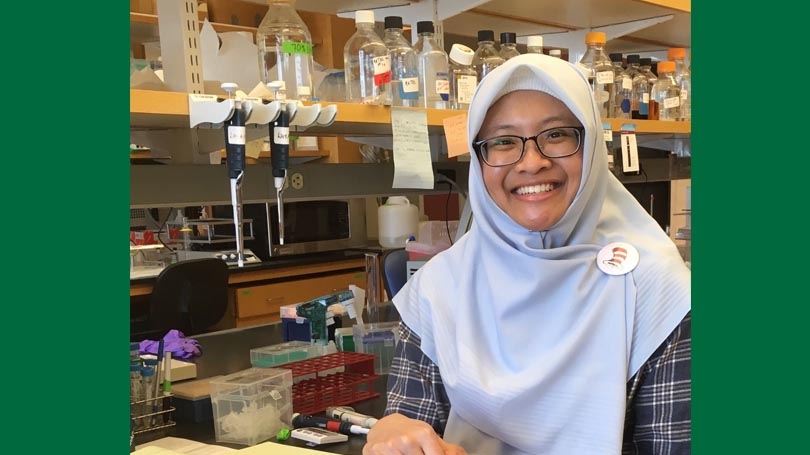
Aisha Mohamed is a 2nd year graduate student in the Molecular and Cell Biology (MCB) Program at Dartmouth
This is part of a series of articles profiling up-and-coming female STEM graduate students on Dartmouth’s campus, in recognition of International Women’s Day on March 8th.
If there’s one word that describes Aisha Mohamed, a 2nd year graduate student in the Molecular and Cell Biology (MCB) Program at Dartmouth, it’s versatility. She’s a jack of all trades with a knack for scientific research, a talent that prompted her to seek opportunities across a multitude of disciplines.
Her journey began during her bachelor’s degree in Singapore, where she was interested in forensic pathology and science communication. To gain more experience she took up work in a cancer lab, where she studied Epidermal Growth Factor Signaling in Non-small-cell lung cancer. This experience spurred her desire to obtain her master’s degree in Molecular Pathology and Genomics at Queen Mary University in London. She also conducted research in a neuroscience lab, where she was involved in developing optogenetic tools to study neuronal function in Zebrafish.
Upon arriving at Dartmouth in pursuit of her PhD, she dabbled in immunology research before finally settling into the lab of Dr. Diwakar Pattabiraman, where she’s trying to understand how breast cancer cells evolve or transition from a less aggressive type (luminal) to a more aggressive type (basal). She’s thrilled to be returning to her love for cancer research: “Of all the research that I’ve done, I absolutely enjoy this the most.”
The breadth of her experience gave Aisha perspective on what she wanted to do. “I’m glad I didn’t rush into things, that I took the time I needed to understand the parts of research I find most rewarding,” she shares. “I knew it was important that, whatever I ended up doing, it had a clear and direct benefit to clinical patients.” Aisha was intrigued by other graduate programs at Dartmouth that emphasize the translational aspect of research, but was limited as an international student: these programs don’t extend Skype interviews to applicants, and require them to interview on their own dime. The MCB Program, however, recognized Aisha’s talent and passion for research, and recruited her to the College. “I’m so glad to have found a home here. People in my program don’t treat me differently because I am older. I feel like the maturity I’ve gained over the years has equipped me to deal with the mental stress of a PhD.”
Aisha acknowledges the difficulty that the dearth of female faculty at Dartmouth presents. As she assembled her qualifying exam committee, Aisha came to fully realize the proportion of Dartmouth female researchers in her area of expertise. “There aren’t enough women faculty to go around,” she says. “The few women faculty we have are overburdened, because all female graduate students want at least one woman on their committee. It’s not fair to anyone involved.” In addition to working towards gender parity, Aisha suggests that Dartmouth institute a mentorship program in which female faculty are paired with graduate students who want that kind of mentorship. “Dr. Pat Pioli has been such an inspiration to me, not only on the research level but on a personal one as well,” Aisha states. “I’m just lucky to have rotated in her lab, and I think other students should get this same type of opportunity.”